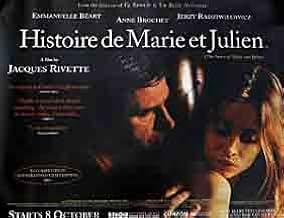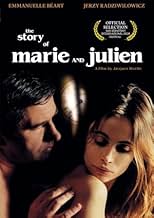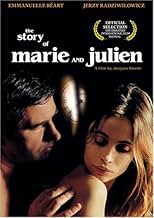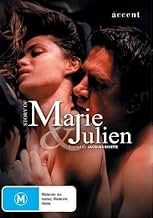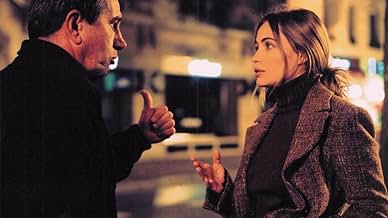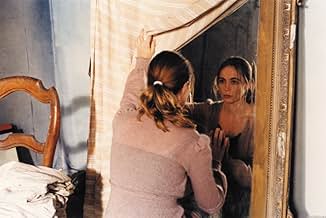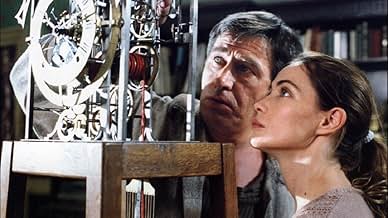Adicionar um enredo no seu idiomaMiddle-aged Julien lives alone with his cat. He dreams of Marie, and a few minutes later, he sees her on the street and makes a date. He asks her to move in with him, and she does. Her boyfr... Ler tudoMiddle-aged Julien lives alone with his cat. He dreams of Marie, and a few minutes later, he sees her on the street and makes a date. He asks her to move in with him, and she does. Her boyfriend is dead, the rest of her past a mystery. Although they quickly seem to fall in love, ... Ler tudoMiddle-aged Julien lives alone with his cat. He dreams of Marie, and a few minutes later, he sees her on the street and makes a date. He asks her to move in with him, and she does. Her boyfriend is dead, the rest of her past a mystery. Although they quickly seem to fall in love, she sometimes pulls away suddenly from him, is distant, and spends the night in a hotel. S... Ler tudo
- Direção
- Roteiristas
- Artistas
- Prêmios
- 1 indicação no total
Avaliações em destaque
Can't they understand that, to share something with the others, it's important to have some ideas (just a small one, please...) about the movie itself? Do they think that when they proclaim their boredom they are giving to the world some kind of undisputed law?
Is it so difficult to understand that the Rivette work cannot be understood by the rules of mediocre entertainment? Is it so painful to address the simple idea that Rivette keeps filming the mystery of love? And that he doesn't want to bore us with the vulgar ideas of a vulgar TV-movie?
This much is certain: compared to what is surely Rivette's biggest claim to fame, 'La belle noiseuse,' this is far more abstruse in its artistic machinations. Here he and his co-writers blend together drama, romance, and mystery with the supernatural, a sad and ultimately kind of depressing story of love, tragedy, loss, and farewells. Unlike that picture of twelve years prior, in which four hours passed incredibly smoothly and beautifully, these two and one-half hours are most definitely felt as the narrative crawls sideways as much as forward. Down to the last few spoken lines of dialogue I don't know if everything Rivette and his collaborates intended is fully and perfectly communicated, yet be that as it may, and even with the length in mind, by and large I think this is splendidly well done. With or without the less evident intentions I think the storytelling could have been tightened, but regardless there's welcome complexity and lush detail in the writing of the characters, scene writing, and overall plot, and the dialogue tends to simply add another layer of flourish and ingenuity. Similarly, one readily discerns the utmost finesse in William Lubtchansky's cinematography, with more discrete emphasis on lighting than one customarily sees in modern cinema. Not to be counted out, the production design, art direction, costume design, and hair and makeup are all terrific, very easy on the eyes as they lend to the artful airs about the proceedings. In this instance I think the cast are a little less noteworthy than the otherwise construction, but all perform admirably, and of everyone in front of the camera Emmanuelle Béart definitely stands out most; her role requires splits between charged emotions and gratifying nuance, and she navigates that space most deftly.
As suggested, I think 'Histoire de Marie et Julien' is something I'd appreciate more if I sat for it a second time, and perhaps with a more focused mind. I recognize that there are doubtlessly subtleties here that I'm just not picking up on - or at least, I hope that's the case, because the alternative is that I'm giving Rivette too much credit. Some of my favorite movies share far more in common with this than not; this is an example that just doesn't meet with the same success for me. Even so, I did enjoy this feature, and I think it deserves a look, even if it's less than totally impeccable. Given the pointedly subdued tone this maintains, and the storytelling that's less than completely straightforward, I can understand how this won't appeal to everyone, and I'd suggest it most for those who are already receptive to the more arthouse side of the medium. Yet while the film is no great revelation by any means, I think it's well done even as I see it, and other attentive viewers will unquestionably get still more out of the experience. Temper your expectations and don't go out of your way for 'Histoire de Marie et Julien,' but if you do have the opportunity to watch, it's worth exploring.
The result of this unveiling, this outwardly old man's return to purity, hope and youth, for those ready to receive it, is a movie that accomplishes what so many charlatans through history have promised -- it defeats death. If you don't shudder at Emmanuelle Beart's final line, if you don't get a frisson at the opening sound collage of car motors and pedestrian noise being swallowed up by a ghostly drone, that's fine, it just means you are being kept in the dark temporarily while you complete your mission, whatever that may be. It's not for me to blurt out in a review what Rivette knows must not be said directly. Well, not in a FREE Internet review, anyway.
P.S. See if, during one of the numerous sex scenes in this film, you can spot the oblique reference to Heinrich von Kleist's strangely cinematic play Penthesilea ( it dates from the early 19th century yet was considered unstageable then, being written like a modern film script with tons of brief scenes. ) I thought I was hallucinating this reference until I saw a Rivette documentary from 1990 where he talks about Kleist. The play, as everyone who has read it knows, is the greatest ever written about the damage that men and women do to each other on earth. That is half of what this film is about, too. The other half isn't about earth at all.
It all comes down to casting the right woman because her male counterpart, though a better actor in this, is quite repulsive. Why cast an old, overweight and ugly man as the love interest of such a dreamy woman ? You don't want her being touched by that man and you can hardly believe she would love him so passionately since nothing about his looks or personnality make him stand out in a good way. Quite the opposite actually.
As for the story, it is really weird, if not completely absurd but again, with Béart as its main subject, you cannot stop watching.
So basically, if you are not a fan of hers, just walk away.
Rivette was the first great proponent of what became known as the French New Wave. His contemporaries like Godard and Truffaut respected him, and followed in his path. (Incidentally, Rivette died in January 2016.)
As the title tells us, this film is a story--actually a love story--about Marie and Julien. Julien, played by the excellent actor Jerzy Radziwilowicz, repairs large clocks that are placed in bell towers. He lives a quiet life with his cat, Nevermore, until he chances to meet Marie. (Marie is portrayed by Emmanuelle Béart.)
Also, as we learn when the movie begins, Julien is a blackmailer. He has found some incriminating material about a woman we only know as Madame X (Anne Brochet). She is willing to pay his price, and the blackmailing proceeds, in stages, throughout the film. No one seems to notice or care that Julien is a blackmailer. Apparently, this is just a small quirk.
For the record, Anne Borchet is a beautiful woman. Rivette loved to direct beautiful women. These included many of the most famous women actors of the era--his muse, Bulle Ogier, Sandrine Bonnaire, and Anna Karina. However, none of them can compare to the chemistry that Rivette shared with Béart.
Emmanuelle Béart was extraordinarily beautiful. We know it, she knows it, and director Rivette knows it. The part of Marie requires someone truly beautiful, because she is the true protagonist of the movie. There are long takes where only Marie is on screen. We see her wandering around Julien's house, touching things, looking into cabinets, arranging a room. If Marie weren't beautiful, we wouldn't really care about how interesting she is, how unusual she is, or how mysterious she is. With Béart in the role, we care.
When the film was produced, Béart was 40. She had lost the ingenue qualities we had seen in Manon of the Spring and La Belle Noiseuse. However, she had lost none of her beauty, and Rivette utilized it every time he presented her to us. She made the movie work.
Special note should be given to Julien's cat, Nevermore, played by Gaspard. Gaspard is everywhere when we are in Julien's home, and although he doesn't have a speaking role, the other actors all talk to him. (At one point Marie tells him, "Stop spying on me. Mind your own business.") Nevermore wears a bell, so when you don't see him, you hear him. (It's true that, when they are hunting, cats are so agile that they keep the bell from ringing. Nevermore doesn't care if the bell rings. It's his theme song.)
We saw this film on DVD, and it worked very well. Naturally, Rivette crafted it for a movie theater audience, but the small screen was fine.
This is a slow film, with many long quiet moments. If you want action and excitement, it's the wrong movie for you. However, if you want to see a thoughtful, unusual movie, find Marie and Julien and watch it.
Você sabia?
- Erros de gravaçãoWhen we see Marie choosing chairs to place in the garret, after she removes the second chair and returns to the garret empty-handed, a small stool is inexplicably where the chair had been.
- Citações
Marie: [during sex] I'm a warrior.
Julien: An amazon.
Marie: No. I keep my breasts for you, my friend. we're in the middle of a plain, a dessert.
Julien: Around us, a horde. It's our first battle.
Marie: I take over, come on top of you. I hunger for you. I eat you till I'm sick.
Julien: You tear me apart with your teeth, your nails.
Marie: You eat my sex.
Julien: It smells like wet soil. I stick my tongue and fingers in. Smell.
Marie: It's true. It smells like wet soil.
Julien: You faint. I take you in my arms. I take you...
Marie: Far... far from the battleground.
Julien: You wake up... you cry... scream.
Marie: You will deliver me.
- Trilhas sonorasOur Day Will Come
Written by Mort Garson and Bob Hilliard
Performed by Blossom Dearie with Joe Harnell et son quartet, Joseph Harnell (as Joe Harnell) (piano) - Dick Romoff (bass) - Ted Summer (drums) - Jerome Richardson (flute)
© 1962 publishing by Better Half Music and MCA Music Publishing (Renewed), A.D.O. Universal Studio
(p) DIW Records/disk union Co., Ltd.
Avec l'aimable autorisation de Unisersal Music projets spéciaux
Principais escolhas
- How long is The Story of Marie and Julien?Fornecido pela Alexa
Detalhes
- Data de lançamento
- Países de origem
- Idioma
- Também conhecido como
- The Story of Marie and Julien
- Locações de filme
- Empresas de produção
- Consulte mais créditos da empresa na IMDbPro
Bilheteria
- Faturamento bruto mundial
- US$ 66.543
Contribua para esta página


